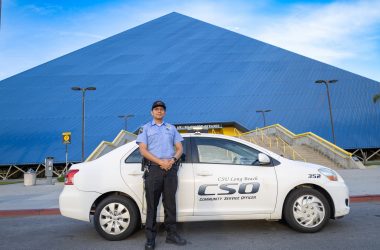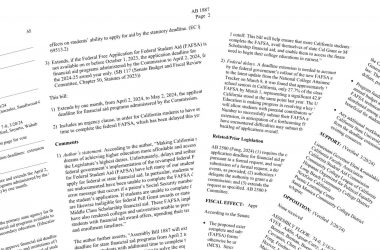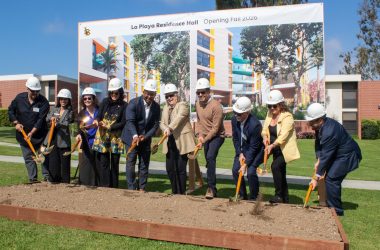Dressed as a banana, Melissa Ramero taught students how to compost in order to promote efficiency and sustainability on campus at Wednesday’s farmer’s market, located on the Friendship Walk.
Ramero, the ASI sustainability assistant and a senior environmental science and policy student, and Abraham Burciage, a senior environmental science student, showed students what the various waste cans in the University Student Union are for and what is compostable.
“Not only is it good for the campus, but this is knowledge that is applicable at home as well,” Burciage said.
CSULB conducted a waste audit in 2010, Ramero said. The campus produced over 4000 pounds of garbage, and more than half of it was compostable. Ramero said this was a big problem.
“If half of our waste can be reused, why haven’t we done that?” Ramero said. “Composting is something students can very easily do to help out the environment; it should be encouraged.”
ASI introduced compost bins to the USU on Feb. 22, 2014 as an Earth Day initiative. Ramero said the campus has been in the process of bringing composting to campus since 2009 when popular interest arose. ASI worked with CSULB’s waste management company, Athens and American Organics, to handle large-scale composting.
“Our waste is picked up and ‘magically’ turned into compost and sold to California farmers,” Ramero said.
ASI has promoted the education of compositing since the bins became accessible. “Trash Talk” is a program in which members of the program talk to students in the USU at lunchtime about what in their lunch is compostable.
“Any food waste, including meat, leftover food, bones, is all compostable. So are all paper products, like coffee cups, soiled napkins, greasy wrappers…” Burciage said.
Wednesday was the second time ASI members have come to the farmer’s market to teach about compost. Burciage said that even with the compost bins, a lot of students still don’t know to use them.
“Waste management in general is still flying under the radar,” Burciage said.
Ramero said that students often think the compost bins are trashcans and that she’ll find plastic in them, which is not compostable. She said the first step in waste efficiency was to get the compost bins on campus, and now the next step is to educate students on properly composting.
Pauline Laguitan, a freshman political science major, said she already knew about composting and is an avid recycler.
“I didn’t realize our school composted though,” Laguitan said. “This is a good, healthy way to be proactive about helping the environment.”
Ramero said it is important to get as many people on campus educated about composting because it is a group effort.
“In order for this system to work, everyone has to work together,” Ramero said. “Everyone’s small contribution adds up in the end.”




Hi, i’m Melissa Romero (the one in the story). I was wondering if there was any way I could get the pictures that Amy took that day that she interviewed me. I’m hoping to include them on a webpage, credit will be given to her for the photographs. Please email them to me if possible. Thank you.
Please contact the Editor in Chief at [email protected]